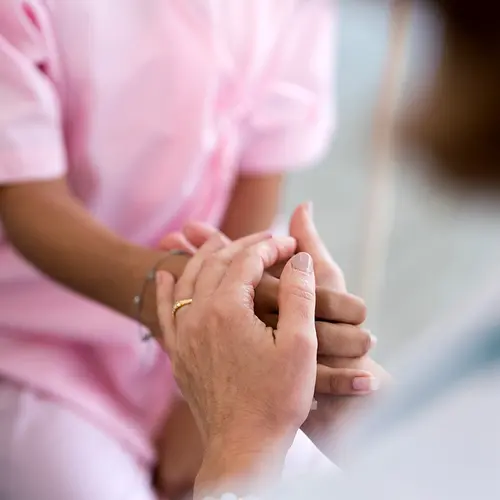Discussing Palliative Care

Hide Video Transcript
Video Transcript
DELTRA JAMES
Hi, I'm Deltra. And I've been living with metastatic breast cancer since 2019. I'm here to share tips if you need to talk to your doctor about palliative care. [MUSIC PLAYING]
You may be wondering about the differences between palliative care and hospice care. And those words may seem interchangeable, but the two are quite different. Palliative care is something that you'll want to discuss with your oncologist early on in your treatment because your palliative care team will help you to manage side effects and symptoms you experience as a result of your treatment. So any aches or pains, they would be able to refer you to medication, or just therapeutic treatments.
Hospice care is something you'll want to discuss towards the end of your cancer treatment. Your oncologist may bring up hospice care if they feel that you no longer qualify to receive cancer treatments.
Before your visit with the palliative care team, you'll want to make sure that you have good notes to share on any symptoms you're experiencing. Be ready to talk and share what you're open to, whether that is integrative therapies that you want to seek, or if you're willing to take on more medications.
It can be helpful to bring a support person with you as you meet the palliative care team, so that you can both get a good understanding of what it is they do and what they don't do. This can help to reduce any fears and anxieties. When starting palliative care, it's important to let your oncologist know about your treatment goals, so that you can track any changes, for good or for worse.
It's helpful to keep notes, so that where you started, and who you're seeing, and how things have progressed. It's important to talk to your doctor about comorbidities because your doctor needs a full picture of your lifestyle. They need to know what needs to be discussed, so they can help you figure out what you need to work on so that it works alongside your treatment plan and goals for your health.
As the patient, it's important that you feel in charge in the driver's seat of your health journey. And while you certainly want to ask questions and push for peace when it comes to all decision making in your treatment plan, it's important to also make sure that the decisions that you choose to make are backed by expert opinions. It may be difficult to ask your doctor specific questions about your palliative care, but it's important to bring up any concerns as well as goals that you have, and to be prepared to get hard answers to those hard questions.
Remember that it's OK to share your emotions about your cancer treatments and journey with your care team. It's important to discuss the financial side of palliative care with your doctor. Before going into your goals and the treatment plan, you'll want to know what to expect. You may find that your cancer center provides some palliative care services for no charge.
If you're struggling to understand what your doctor has explained to you about palliative care, don't feel afraid to ask them to repeat themselves, to provide you with pamphlets or books. All sorts of resources are available, and they may be able to connect you to have a consultation with someone from the palliative care department.
If you're looking for people who are using palliative care in their metastatic breast cancer journey, you may want to seek them out through your cancer center, ask about support groups that are for those living with late-stage cancer. You may also find people through apps, or through social media groups that are specific to your type of cancer.
